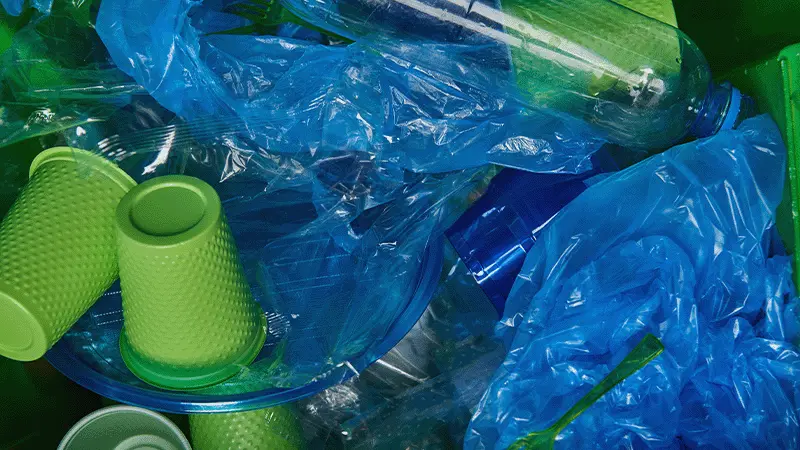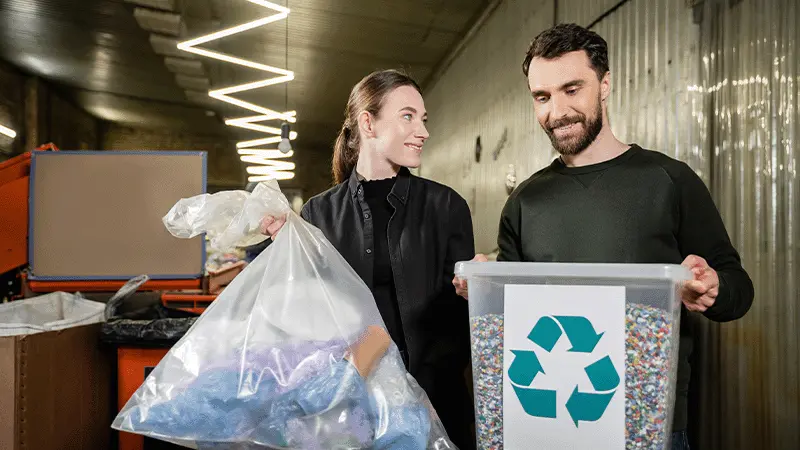The importance of plastic recycling plays a critical role today in achieving environmental protection and sustainability goals. Recycling plastic waste is vital for resource efficiency and waste management success. These processes reduce environmental impacts. At the same time, they contribute to the economy by helping to maintain ecological balance. The effective operation of recycling facilities significantly reduces the amount of plastic waste. Thus, it makes the reuse of plastics possible. Burkasan, a pioneer in this field, is in a leading position in plastic recycling with its innovative technologies and sustainable solutions.
Contents
- Environmental Benefits of Plastic Recycling
- Most Effective Plastic Recycling Methods and Technologies
- Plastic Waste Management: Strategies for Sustainability
- Economic and Social Contributions of Plastic Recycling
- Burkasan: Turkey’s Leading Plastic Recycling Company
- Frequently Asked Questions
- Conclusion
Environmental Benefits of Plastic Recycling
The environmental benefits of plastic recycling are critically important for sustainability and environmental protection. Through plastic recycling, the efficient use of natural resources is ensured. At the same time, a significant reduction is observed in waste management processes. Recycling plastic reduces the carbon footprint and combats climate change. Additionally, plastic recycling contributes to preventing water and air pollution by maintaining ecological balance. This process saves energy and reduces fossil fuel use, minimizing environmental impacts. These environmental benefits of plastic recycling are an indispensable tool in achieving nature conservation goals. Furthermore, it significantly contributes to the goal of leaving a livable world for future generations. Leading companies in this field, such as Burkasan, maximize the environmental benefits of plastic recycling with their innovative solutions and sustainable practices.

Most Effective Plastic Recycling Methods and Technologies
The most effective methods and technologies in plastic recycling are critical for ensuring environmental sustainability. Additionally, they make significant contributions to minimizing plastic waste. Mechanical recycling produces new products by reprocessing plastic waste. This method is also advantageous in terms of energy efficiency. Chemical recycling converts plastic polymers into raw materials, preserving their quality for long-term use. Thermal recycling uses incineration or pyrolysis of plastic waste to generate and save energy. Lastly, biological recycling methods aim to break down plastics and reintroduce them into the natural cycle using biological processes. Advanced recycling technologies boost efficiency and reduce the carbon footprint. Effective recycling methods ensure environmental protection and economic sustainability.

Plastic Waste Management: Strategies for Sustainability
Plastic waste management requires the development of strategies that are vital for achieving sustainability goals. Effective waste management involves source separation and recycling optimization. Additionally, fundamental steps such as reducing plastic usage are an important part of this process. These strategies ensure the conservation of natural resources and prevent environmental pollution. Plastic recycling helps maintain ecological balance by reducing the amount of waste. At the same time, it is supported by modern technologies that provide energy savings. Applying circular economy principles enables plastic reuse as valuable raw materials. Sustainable waste management supports the environment and economy, led by Burkasan’s innovations. With these comprehensive strategies, plastic waste management becomes more efficient and environmentally friendly. Thus, it supports leaving a clean and livable world for the future.

Economic and Social Contributions of Plastic Recycling
Plastic recycling provides significant contributions to both economic growth and social development. Economically, the plastic recycling sector creates new job opportunities and increases employment rates. Recycled plastic materials reduce production costs, offering economic advantages to businesses. At the same time, they enable the implementation of circular economy principles. Recycling plastic ensures resource efficiency and supports a sustainable economy. Social benefits include better environmental health, quality of life, and awareness. Plastic recycling cuts pollution, protects health, and fosters livable cities. Burkasan maximizes plastic recycling’s benefits with innovative, sustainable solutions. In this way, they make significant contributions to the development of societies and economies.

Burkasan: Turkey’s Leading Plastic Recycling Company
Burkasan offers sustainable solutions as one of Turkey’s most advanced plastic recycling companies. With eco-friendly and innovative methods, Burkasan leads in plastic recycling. The company recycles plastic waste, preserving resources and reducing the carbon footprint. Burkasan’s high-capacity recycling facilities enable the reuse of plastic materials while maintaining their quality. This significantly accelerates the circular economy. Through widespread plastic recycling projects across Turkey, Burkasan supports environmental sustainability. Additionally, Burkasan makes important contributions to economic growth. With a customer-focused service approach and a continuous quest for innovation, Burkasan stands out as a reliable business partner in the plastic recycling sector. Discover environmentally friendly and economical solutions with Burkasan, Turkey’s pioneering plastic recycling company.

Frequently Asked Questions
1. What are the environmental benefits of plastic recycling?
Answer: Plastic recycling plays a critical role in reducing the negative impacts on the environment. Through recycling, plastic waste does not end up in nature, which helps prevent soil and water pollution. Additionally, it contributes to the conservation of natural resources by reducing the raw materials used in plastic production. Plastic recycling cuts the carbon footprint by using less energy than new plastic production.
2. Why should we recycle plastic?
Answer: The main reasons for recycling plastic include environmental protection, efficient use of natural resources, and improved waste management. Plastic waste can take hundreds of years to decompose in nature, potentially harming ecosystems during this process. Recycling ensures that these wastes are reused, thereby protecting the environment and contributing to the economy. Additionally, recycling reduces the amount of plastic waste, lowering storage and disposal costs.
3. How does the plastic recycling process work?
Answer: The plastic recycling process typically consists of five stages: collection, sorting, cleaning, processing, and manufacturing. First, plastic waste is collected from collection points and transported to recycling facilities. Then, the plastics are sorted by type and color. The sorted plastics are cleaned to remove any contaminants such as labels and dirt. After cleaning, the plastics are ground into small particles or melted into a molten state. In the final stage, the recycled plastics are used to produce new products. This process ensures the effective utilization of plastic waste, making it an important step toward a sustainable environment.
4. What are the economic benefits of plastic recycling?
Answer: Plastic recycling provides various economic benefits. The recycling sector creates new job opportunities and increases employment rates. Additionally, recycled plastic materials lower production costs, offering economic advantages to businesses. Implementing circular economy principles allows for the reuse of plastics and their evaluation as valuable raw materials, which ensures more efficient use of natural resources and supports economic sustainability. Plastic recycling also reduces waste management costs, thereby contributing to public budgets.
5. How does recycling plastic waste combat climate change?
Answer: Recycling plastic waste plays a significant role in combating climate change. Recycling processes require less energy compared to producing new plastics, which helps reduce greenhouse gas emissions. Moreover, recycling plastic waste instead of incinerating it decreases carbon emissions and prevents air pollution. In this way, plastic recycling helps reduce the carbon footprint and contributes to creating a more sustainable environment in the fight against climate change.
6. Which plastics are recyclable?
Answer: Recyclable plastics generally include types such as PET (Polyethylene Terephthalate), HDPE (High-Density Polyethylene), PVC (Polyvinyl Chloride), LDPE (Low-Density Polyethylene), PP (Polypropylene), and PS (Polystyrene). These plastics can be processed in recycling facilities and transformed into reusable materials. However, not all plastic types are suitable for recycling, and proper sorting is essential. Additionally, labels and recycling symbols help determine whether a plastic is recyclable.
7. What are the social impacts of plastic recycling?
Answer: Plastic recycling also provides significant social benefits. It protects environmental health and enhances the quality of life in communities, contributing to the creation of more livable cities. Recycling projects help raise environmental awareness in communities, encouraging the adoption of sustainable living habits. Furthermore, job opportunities in the plastic recycling sector contribute to local economies and support workforce development. Consequently, plastic recycling supports social sustainability and improves the overall well-being of societies.
Conclusion
The importance of plastic recycling is indispensable in terms of environmental protection, economic growth, and social sustainability. Effectively recycling plastic waste preserves natural resources, reduces the carbon footprint, and supports the health of ecosystems. Additionally, the recycling sector contributes to economic development by creating new job opportunities while enhancing the quality of life by increasing environmental awareness in communities. Thanks to the most effective plastic recycling methods and technologies, waste management becomes more efficient, while leading plastic recycling companies in Turkey, such as Burkasan, make significant contributions to achieving sustainability goals with their innovative solutions. By investing in plastic recycling, we can protect our environment. This way, we can build a strong future both economically and socially. Therefore, supporting plastic recycling and adopting proper waste management strategies is a collective responsibility for all of us.

